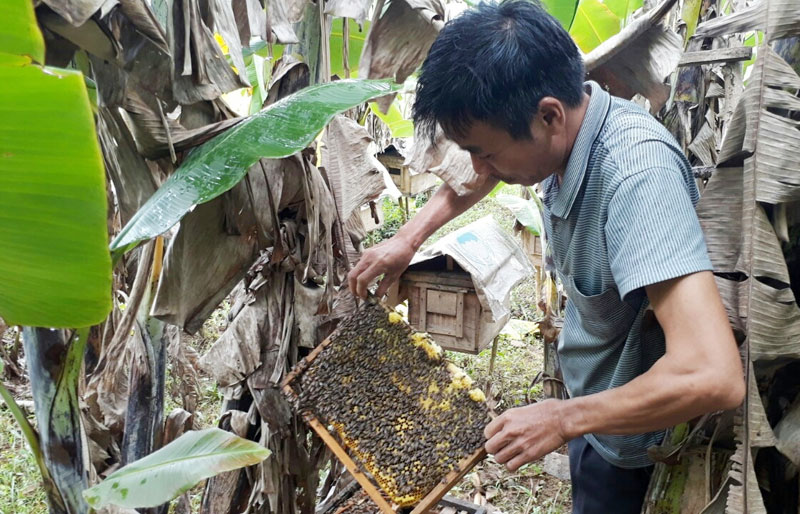
(HBO) - Taking advantage of available resources, in recent years, more and more households in Thuong Tien Commune (Kim Boi) have developed the career of beekeeping for honey and brought high economic efficiency

Mr. Bui Van Dao, in Luon village, Thuong Tien
commune (Kim Boi) is checking and monitoring honey bees.
Mr. Bui Van Dao's family is the first
household in Luon village to raise bees for honey. At first, he raised only for
family use or sold 1-2 bottles of honey. Recognizing the economic efficiency in
line with his conditions, he developed strong beekeeping work. Currently, he
has 300 herds of bees, each with 4 to 5 bee honey exploitation panels, in
addition, he also sells bee breed. "In the season of longan flowering, I
move the bees to the areas of various longan trees. I also placed more than 10
beehives on a forested area handed over for 50 years for bees to get the
natural forestry honey. Every year, I turn to get honey in 8 to 10 times, each
time with 300-400 liters, depending on the time. At the price of 160,000 VND /
liter, in 2018, I earned nearly 200 million VND "- Mr. Dao shared.
In recent years, the beekeeping career has
developed and expanded to some other villages. Ms. Bui Thi Ha's family in Vang
village started to raise bees from late 2017 with 30 herds. Despite new raise,
she can get the economic efficiency. She said that she had turned for honey 6
times, about 15 liters each. Raised bees are indigenous bees, clean honey,
because if plant protection drugs are used, bees will die or fly away.
Recognizing the advantages in honey bee
farming, some projects implemented in the commune have helped local people
develop beekeeping career. Ms. Dinh Thi Huong, Chairwoman of the Commune
Women's Union, said that from 2017, the Childfund project provided 15
households to get free- interest loans with a total amount of VND70 million
(five million dongs each) in the period of five years for bee growing. Just
over one year, the loaned households have grown to 105 more honey bee herds.
In the whole Thuong Tien commune, there are
more than 20 households raising bees with over 1,000 herds. Promoting the
advantages of being located in Thuong Tien Nature Reserve Zone, the commune has
the potential to develop bee keeping business with clean quality honey.
Dao Village’s honey – a product certified with a 3-star OCOP (One Commune One Product) rating by Thong Nhat Agricultural Cooperative in Dao Village (Hoa Binh City) – is highly regarded by consumers for its quality, richness, and variety in packaging. The distinctively sweet taste of Dao Village’s honey leaves a lasting impression on anyone who has tried it.
In alignment with Project No. 07-DA/TU, issued by the Hoa Binh provincial Party Committee on November 1, 2021, Lac Thuy district has actively promoted investment and supported the sustainable development of its industrial and handicraft sectors during the 2021–2025 period. Alongside this, the district has remained committed to preserving and revitalising traditional craft villages.
Located in the northern part of Lac Thuy district, with a temperate climate and fertile soil, Phu Thanh commune has great potential and advantages in growing tea. The long-standing experience, combined with strict adherence to organic farming practices in the tea gardens, ensures that the dried tea products from Phu Thanh and Lac Thuy as a whole are sold out immediately upon production, providing a stable and prosperous life for the local people.
Amid efforts to streamline the administrative apparatus, Hoa Binh province has intensified measures to address challenges in land clearance, resettlement support, and infrastructure investment, aiming to speed up the progress of key projects.
Hoa Binh province has posted an unprecedented economic growth rate of 12.76% in the first quarter of 2025, marking its highest quarterly performance to date and positioning it as the second fastest-growing locality in the country, trailing only Bac Giang province.
Under current regulations, products in the One Commune – One Product (OCOP) programme that are rated three stars or higher must undergo re-evaluation every three months. However, in reality, some of these products fail to consistently meet the required standards, raising concerns about the sustainability of their OCOP certification. This underscores the urgent need for producers to enhance product quality and gradually develop their OCOP products into strong, marketable brands.



